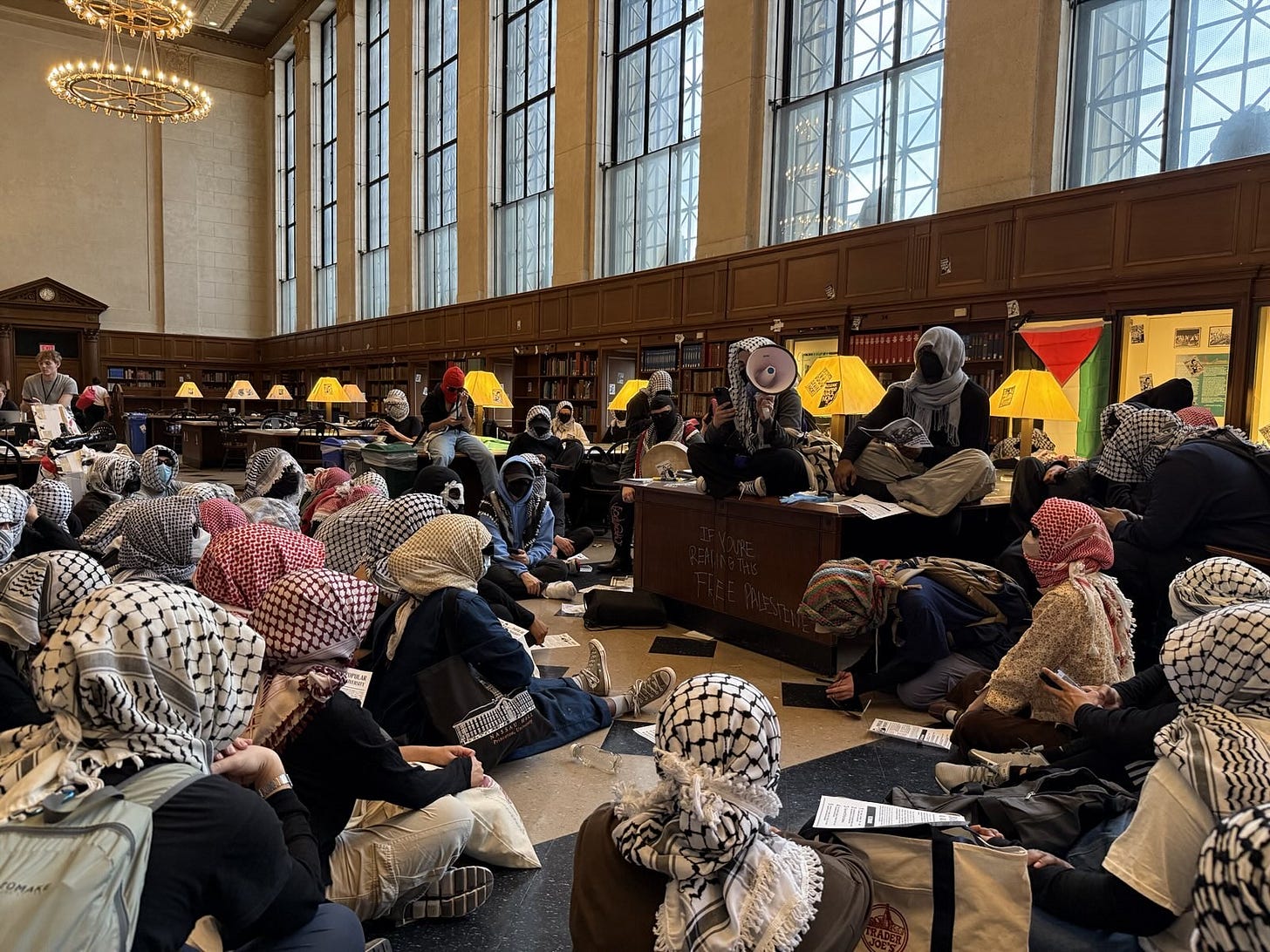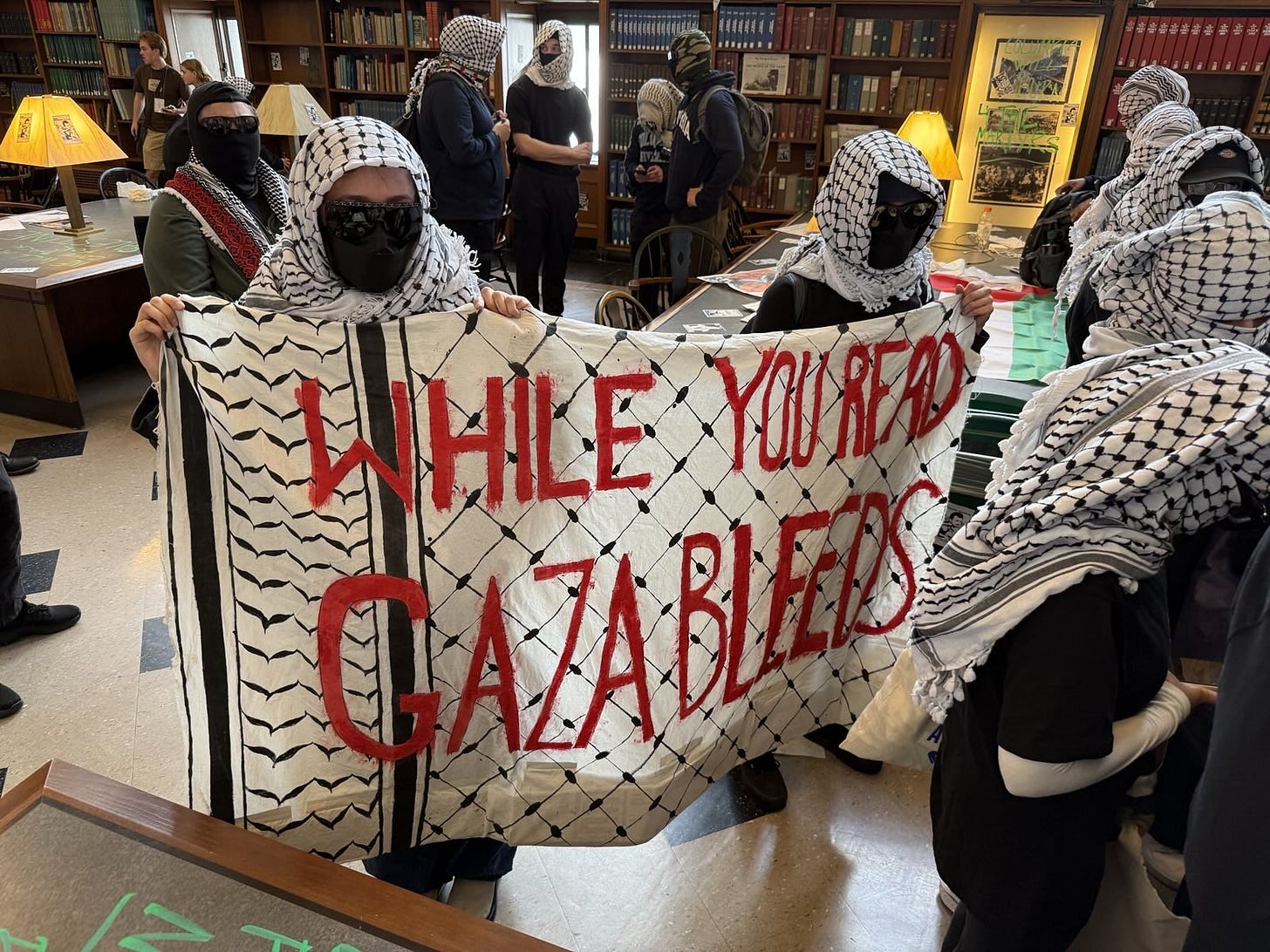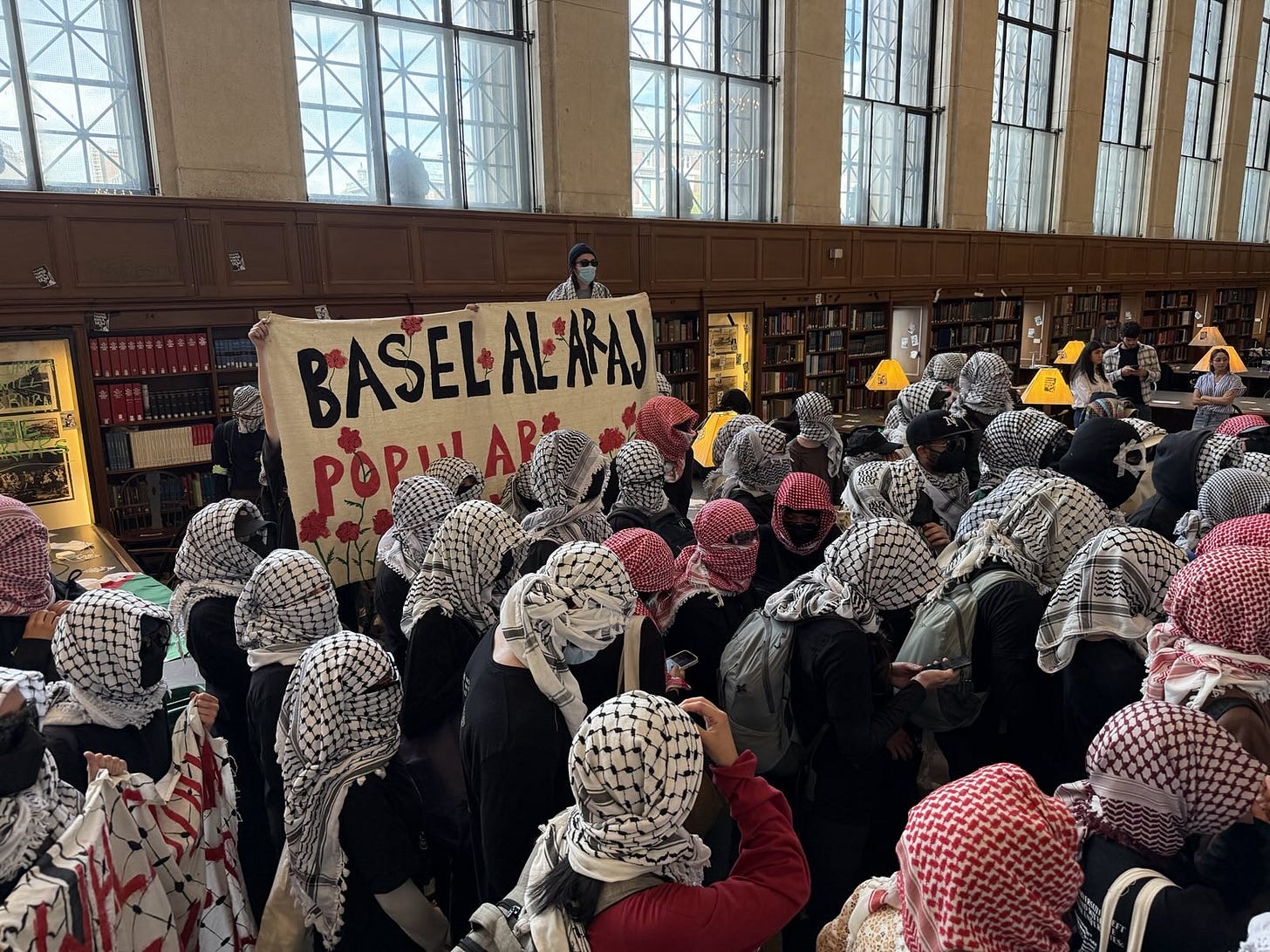What is on Trial at Columbia? Students of the Basel al-Araj Popular University Speak Out During Disciplinary Hearings
A Library Transformed: The Birth of the Basel al-Araj Popular University
On May 7, students launched the Basel al-Araj Popular University inside the main reading room of Columbia’s Butler Library. The students delivered speeches and engaged in collective learning about Palestinian liberation and Columbia's complicity in genocide. The renaming of Butler Library was not merely symbolic. It was a declaration of the students' commitment to resistance amid escalating risks, and a gesture of solidarity with the spirit of popular resistance that emanates from Palestine to those of us in the heart of empire. The functional liberation of the library was expressed through student-made banners and art, carefully curated reading materials, and the disruption of business-as-usual during finals week.
The programming was punctuated by escalating waves of brutality from Columbia’s Public Safety officers and privately hired guards from Allied Security. Protestors were prevented from leaving the building, with doors to the room either locked from the outside or blocked by rows of public safety officers. Doors on the main floor of the library were handcuffed shut. While trapped in the room, protestors were threatened, beaten, and choked by officers. Students attempted to organize themselves into a blockade to exit the room without leaving comrades behind. During moments of rest, they conducted teach-ins—to educate both themselves and the security personnel holding the doors at the behest of Columbia's administration.
The only permitted 'exit' came with the condition of approaching and showing a Columbia University ID card to the same guards, who continually harassed and assaulted anyone within reach. Following hours of sustained confrontation with Public Safety officers, the protesters were arrested by the notorious Strategic Response Group—a wing of the NYPD specifically trained to break up protests. Columbia's acting president and former co-chair of its Board of Trustees, Claire Shipman, invited the SRG to forcibly remove the protesters. But even as they were taken away, the protest continued. Their chants echoed across the hundreds of fellow students who had amassed around the institution to confront the police and the administration.
In the aftermath, 71 students are now facing harsh disciplinary charges, proposed by Columbia’s Rules Administrator, Gregory Wawro under direct instruction from the Board of Trustees. These include one- to two-year suspensions, permanent expulsions, and even degree revocations. Disciplinary hearings concluded on July 2 at Columbia and on July 9 at Barnard, while those at Teachers College are ongoing. No determination has yet been made on whether the proposed sanctions will be implemented.
To expose the truth behind the arrests and the farce of Columbia’s disciplinary process, we turn to the voices of those who built the Basel al-Araj Popular University in the reading room. What follows are excerpts from the testimonies students delivered during their disciplinary hearings, during which they asserted the righteousness of their actions. These students defended not only themselves but also their comrades, the creation of a space for liberatory learning, and the justice inherent to the fight against genocide and occupation in Palestine. They expressed hope and optimism that the struggle for liberation will continue, and that Columbia's attempts to repress and remove them will never succeed in the face of their solidarity.
Knowledge in the Service of Liberation
We begin with an excerpt from one student’s hearing statement, delivered in defense of the Basel al-Araj Popular University:
“This hearing, we are told, is about policy: a procedural violation, a room, a rule. But that is not what’s truly being judged here. What is on trial is the invocation of Basel al-Araj, a Palestinian intellectual and revolutionary whose life and death continue to expose the violence of every institution that attempts to separate knowledge from struggle.”
While the homage to Basel al-Araj caught the ire of the university, it is notable that the library's original namesake is former university president Nicholas Murray Butler, a Nazi sympathizer who expelled a student for protesting Nazi speakers on campus.
During the Popular University, students gathered to study, reflect, and protest in the name of Basel al-Araj—a Palestinian revolutionary and scholar assassinated in 2017 after being imprisoned and tortured by both zionist forces and the traitorous Palestinian Authority, the body known for its collaboration with the zionist entity.
Another student articulated the political lineage of the action:
“Al-Araj belonged to a tradition of popular universities born in the rubble of occupation—grassroots spaces forged by Palestinians who refused to surrender their right to learn, organize, and resist. These were not safe academic havens; they were weapons in a war against erasure... Knowledge divorced from struggle is betrayal.”
There Are No More Universities Left in Gaza
This legacy of militant intellectualism, rooted in struggle and popular education, is precisely what Columbia has tried to suppress. In Palestine, institutions of education are frequently targeted by occupation forces who seek to destroy Palestinian scholarship, culture, and identity. As one student testified:
“Every university in Gaza has been destroyed. Hundreds of academics have been killed. Books and archives have been incinerated. Entire families have been erased from the civil registry. This is not a war. It is a campaign of erasure.”
Under genocide and scholasticide in Palestine, education itself becomes a form of resistance. Meanwhile, Columbia attacks the very idea that education can and must contribute to liberation. Instead, Columbia hides and hoards its educational materials away from the public, restricting who can access them and prioritizing a false sense of prestige over any sort of educational mission.
“The classroom is not sacred. The library is not sacred. The university is not sacred. Columbia has demonstrated as much. This university is responsible for the destruction of every single university in the Gaza Strip... Through normalization, collaboration, and investment, both direct and indirect, you have established yourselves, individually and collectively, as genocidaires.”
Columbia Continues Escalating its Repression
Rather than divest from the horrific genocide that has destroyed every university in Gaza, Columbia University proceeds with heavy-handed discipline: interim suspensions, stripped access to campus resources, threats of expulsion, and academic derailment.
“In the two months since I and over a hundred others were brutalized by members of ‘Public Safety’ and severed from our campus community... the genocide in Palestine continues to descend into unimaginable depths as over 2 million people face forced starvation, torture and abduction, ethnic cleansing... and the destruction of every single university in the Gaza Strip.”
Columbia admin siccing the NYPD on students has become routine since last spring after the arrests of the first encampments — the first mass protest arrest on Columbia's campus in decades. However, the student movement for Palestine has not cowered or backed down. The university knows their tactics of violent repression aren’t working. But rather than divest from a genocidal project, they escalate further, with the students of the Popular University facing more intense brutality — not only from the NYPD, but also from Columbia's own Public Safety and private security.
Videos from May 7 show public safety officers throwing protesters to the ground, tearing at their clothing, and yelling in their faces. At their hearings, students denounced Public Safety’s refusal to let Columbia University Emergency Medical Service (CUEMS) attend to the injured students. As a result of Public Safety’s actions that day, there were numerous injuries including concussions, and several students were sent to the hospital.
“During our mass unlawful imprisonment in Room 301, I spent the majority of the time attempting to access emergency medical attention for my friend who had been assaulted and concussed... I was laughed at in the face as I begged for the officers positioned at the West exit... to let emergency services in.”
“Public Safety physically blocked CUEMS from entering the room to treat my injured friend... They employed kettling tactics—banned by the NYPD—showing no concern for student well-being...”
Columbia's violent response is an indication of their own weakness. The administration is running out of tactics as the students prove again and again that repression and sanctions won’t stop them. The admin know they are losing in the larger struggle, so they are now resorting to intimidation and brutality in a desperate attempt to prevent the tide of liberation from surging forward. Columbia attacks its students because it fears them. The student movement for Palestine has already caused critical blows to Columbia’s profits, including losing large donors like Robert Kraft and losing $400 million in federal funding. Meanwhile, divestment from the zionist entity surges in popularity, as demonstrated by the numerous referendums passed at Columbia College, Barnard College, and numerous graduate school like the School of Social Work and the Law School.
The University Judicial Board’s Political Theatre
For Columbia students, these hearings were conducted through the University Judicial Board (UJB). (Barnard and Teachers College use separate but equally as punitive and convoluted disciplinary systems.) In response to demands from the Trump administration, Columbia restructured its disciplinary process by relocating the UJB under the Office of the Provost and removing students from its panels—effectively consolidating authority within the university’s executive leadership. These changes, imposed without University Senate approval, have eroded due process protections, stripped students of peer representation, and rendered the disciplinary process increasingly opaque.
In their hearings, the students described the experience as a form of political theater. Outcomes, like Rules Administrator Wawro’s recommended sanctions, appear to be predetermined and participating in the hearings is a performance orchestrated by the university to feign fairness.
“While the University Rules establish that proceedings should be ‘content-neutral,’ it is evident that this entire case is political theater and the sanctioning suggested by the Rules Administrator is unprecedented not only at Columbia, but perhaps by any university in this country. Thus, I understand that this case may very well be out of my hands and that nothing I say may have an impact on the deliberation that you are about to engage in to potentially derail the next several years of my life.”
“This hearing, in its form and content, only affirms that truth...the university has chosen to police political expression while remaining materially tied to institutions of war and displacement.”
“Even if these charges were backed by evidence, this would only betray the moral bankruptcy of Columbia University and a complete admission to your active role in the Zionist holocaust currently being waged against Palestinians in Gaza.”
Students directly called out the Rules Administrator and those sitting on the UJB Panel.
“[The Rules Administrator and other admins] would rather type up thousands of words of unsubstantiated, exaggerated, and one-sided claims than conduct a fair investigation. If they took a moment to look down at the hands they use to type these emails, they would find that their hands are drenched in blood. These are the people who provide cover for Columbia’s investments in genocide.”
“In your deliberations, I hope you question the political and financial motivations behind what is this piece of orchestrated political theatre…I hope you reflect on how Columbia, so desperate for federal forgiveness, rolled over in submission to the Trump administration and complied with every shameful demand. And, I hope you recall that this university’s funding wasn’t yet granted back. Because the beast of reaction will never be satisfied with compliance. They will continuously demand more and more and more.”
“I will not plead for forgiveness. Gregory Wawro, Kui Ren, Elisa Konofagou, Timothy Frye, Andrew Sunshine — it is your hands that are stained red. The blood of the martyrs will never wash off. May you forever be haunted by their cries for freedom.”
"History will vindicate the participants of the Basel al-Araj Popular University. Can you say the same for yourselves?"
The Popular University Endures
Students have not accepted this criminalization quietly. They have made clear that their resistance is not a violation of their educational pursuits or an educational environment. As Basel al-Araj insisted, education demands confrontation with injustice, not complicity in it.
“I believe in a free Palestine, with pride. I grieve in rightful love, anger and resistance... I refuse to allow the genocide of Palestinians to continue on in silence. And I strongly refuse any insinuation that my actions in speaking up for Palestinian liberation from the genocidal occupation is against any school policy.”
“James Baldwin’s speech 'A Talk to Teachers' states, ‘One of the paradoxes of education is that precisely at the point that you begin to develop a conscience, you must find yourself at war with your society.’ Our resistance is a result and essential part of our education.”
These hearings are not neutral. They are weapons of political suppression. But no amount of repression can suppress this movement. No hearing, no expulsion, and no punishment can silence those who have chosen to struggle alongside the oppressed people of the world.
“If this hearing was meant to isolate or shame, it has done the opposite. It has made us more clear: no sanction handed down here can expel principle. Basel al-Araj wrote: ‘Join them, and don’t betray the question.’ We have joined, and we will not betray the question."
“I protest these injustices not just out of rage, but out of a profound hope that the people of the world can overcome the greed and control of those in power — and take that power for ourselves. We can construct a world free from imperialism... where each person lives with dignity. But to do that, we must first challenge the institutions and systems acting as obstacles to this collective pursuit.”
The students of the Basel al-Araj Popular University did not cower before the university’s brutality, nor during their hearings. They confronted it—most stayed in the library, defended their comrades, and refused to yield to Public Safety or Columbia’s administration. In their hearings, they upheld the principles of the Popular University and stood firm in support of Palestinian liberation, even under sanctions meant to repress the movement.
Columbia’s violence in the reading room revealed its weakness in the face of resistance. Its harsh disciplinary actions aim to silence the movement, obscure its own complicity, and remove students it knows it can’t control. But the students will not be subdued. Repression always breeds resistance. Inspired by the legacy of Basel al-Araj, the students' hearing statements show that the movement for Palestinian liberation is only growing stronger and more principled.










As a Columbia graduate, I applaud your courage and commitment and appreciate its personal costs. What little honor the institution of Columbia will have when the history of this time is written will be due to the fact that you, as part of the Columbia community, tried to get the university to do the right thing. Their refusal so far is a stain. One day in the future, as with the French Resistance that fought the Nazi occupation in World War II, many now sitting on the sidelines, will be claiming they were there with you from the start.
Hello – I'm a reporter for The Chronicle of Higher Education. I'm trying to prepare to quickly cover any potential deal that Columbia may reach with the federal government. Is anybody with CUAD willing to talk to me? I'd like to learn what a deal might mean for you — if it would materially change the sanctions your members have faced, for example, or your ability to protest. Talking on background to start is just fine. You can reach me at francie.diep@chronicle.com or on Signal at francie.diep.40 Thank you for considering it.